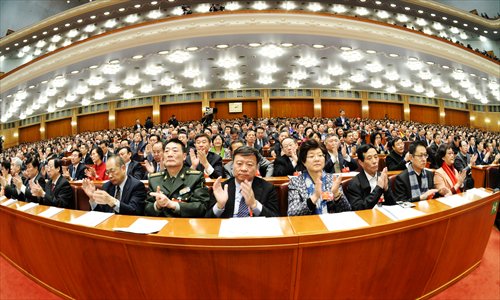China spikes investments
5.3 trillion yuan injected into major projects by January

Members of the National Committee of the Chinese People's Political Consultative Conference (CPPCC) applaud as the top political advisory body concluded its annual session in Beijing on Monday. Photo: CFP
The Chinese government has injected 5.3 trillion yuan ($818 billion) into major projects in the country by the end of January, 253.2 billion yuan more than the end of last year, the National Development and Reform Commission (NDRC) said on Monday.
Despite possible risks, strengthening investments is "indispensable" if China wants to keep its average annual economic growth at or above 6.5 percent in the next five years, as it unveiled at the National People's Congress on March 5, experts told the Global Times.
China's fixed-assets investment increased 10.2 percent to 3.8 trillion yuan in January and February compared to the same period the previous year, according to the National Bureau of Statistics (NBS) on Saturday.
The Chinese government's decision to boost investments comes at a time of slower economic growth from sluggish exports. China's exports slumped 2.8 percent in 2015. The fall went up to 25.4 percent in February 2016 than a year ago on dollar terms, according to General Administration of Customs.
Consumption in China, another major driving force for economic growth, rose in 2015 but not enough to substantially increase GDP growth, Liu Dongliang, a senior analyst at China Merchants Bank told the Global Times on Monday.
"The Chinese government must increase its investments to stimulate the economy, " Liu said.
He also said that the 253.2 billion yuan investment in January seems a bit too intense, but without it, the desired economic effects are unlikely to happen.
China's economic growth slowed to a 25-year low of 6.9 percent in 2015, down from 7.3 percent in 2014, the NBS announced in January.
Xu Hongcai, director of the Economic Research Department under the China Center for International Economic Exchanges, also told the Global Times on Monday that increasing investments does not mean that the government will deemphasize consumption or exports.
China will increase the role of the services sector to its economic growth in the next five years, as the country's new five-year plan stipulates.
Manufacturing input
According to the NDRC, major investments fall into 11 categories, 13 more projects have started construction in January.
Of the 11 categories, seven were launched in 2014 which included environmental protection, clean energy, transportation and healthcare services for the elderly; four were launched in 2015, which included modern logistics and emerging industries.
Zhao Chenxin, a spokesperson for the NDRC, said last month that the NDRC approved 21 fixed-assets investment projects in January, which included three irrigation projects, one public transportation project and six energy projects.
Zhao also noted on Monday that the NDRC approved 15 fixed-assets projects worth 34 billion yuan in February, in areas such as irrigation, energy and the high-tech sectors.
A large part of those projects involve infrastructure, which is also China's "weak area," Xu noted.
"China needs to reinforce infrastructure projects such as bridges and irrigation systems. They not only benefit people's livelihoods, but would also help facilitate the country's urbanization process," he told the Global Times.
Zhao said Monday that a new reservoir project in Xikou, Southwest China's Sichuan Province, approved by the NDRC in February, would effectively alleviate the flood control pressure in surrounding regions, as well as to provide clean energy.
Xu added the government has made efforts to improve its investment structure. The NDRC said the government had approved five high-tech projects in February.
Capacity risk
Zhong Dajun, director of the Beijing Dajun Institute for Economic Observation, said that spiking investments can bring about risks, so great importance should be attached to examining the quality, such as the return rate, of those projects.
"Investments might lead to debt if the projects are not profitable. Especially in infrastructure, which requires a huge investment, the government should be wary of launching projects, " Zhong told the Global Times on Monday.
He also warned of overcapacity risks. "The government has placed much effort into boosting energy projects, but with slumping demand, China might be producing too much energy in the next few years," he noted.
But Xu downplayed the overcapacity issue, as the government has avoided increasing investments in sectors suffering from overcapacity, such as real estate.
Government efforts to deal with overcapacity also continue. Zhao said on Monday that the government plans to cut 500 million tons of coal in about three to five years starting from 2016.
Xu also said that as more and more private companies invest in major projects, market forces would help - and often in a more effective way - decide which projects are worth investing in.
Read more in Special Coverage: